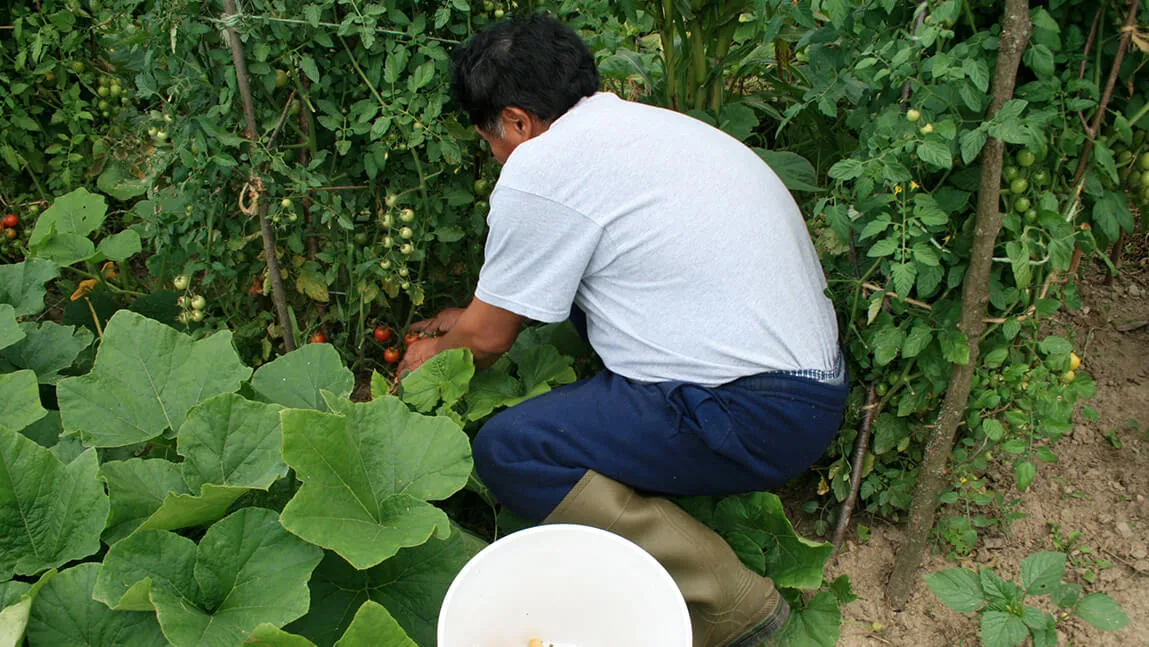Burlington--Migrant farmworkers are essential to Vermont agriculture, from dairy farms to fruit and vegetable farms. The wellbeing of these workers is critical to the future of farming in Vermont, as well as the families and communities they support in their home country.
University of Vermont (UVM) Extension and the UVM Department of Community Development and Applied Economics (CDAE) have long applied action research to understand the priorities of the migrant community, which has lead to designing programs to meet their needs and help them thrive.
Currently, Vermont has an estimated 750 to 850 year-round migrant farmworkers, primarily on dairy farms, with about 150 partners and children. Since no visa program exists for year-round dairy farmworkers, most of these workers likely do not have documentation status. In contrast, about 500 Jamaican farmworkers arrive seasonally to work through the H2A visa program.
A recent Migrant Farmworker Research Roundtable documented action-research projects, advancing both understanding of Vermont’s migrant farmworkers’ perspectives and projects aimed at addressing their needs. A video recording of that webinar is available in both English and Spanish on the UVM Extension website: https://go.uvm.edu/engmigrantfarmer (English) and https://go.uvm.edu/spmigrantfarmer (Spanish).
The webinar presented findings and outcomes from three programs focused on Vermont migrant farmworkers and led to a facilitated discussion about how Vermont can move forward toward improving farmworker wellbeing. To engage a broader audience, simultaneous interpretation was available so Spanish-speaking farmworkers were able to attend and join in the proceedings.
At the roundtable, Dr. Dan Baker, CDAE associate professor emeritus; Naomi Wolcott-MacCausland, Migrant Health Programs leader; and UVM partner Julie Curtin, director of Homeownership for Champlain Housing Trust (CHT), presented information on farmworker safety, assessment of migrant farmworker mental health and outcomes from a program for farmworker housing.
Based on his current research, Baker found that few Vermont dairy farmers speak Spanish and more than three-quarters of workers interviewed spoke little or no English, with more than 60% reporting language barriers as a significant safety issue.
Although agriculture is one of the most dangerous industries in the U.S. for farmers, their families and farmworkers, less than 60% of Vermont migrant farmworkers said they had received any farm safety training. Of those, more than 50% said the training had been from other workers.
The combination of inherent risk, limited training and language barriers contributed to more than half of respondents being injured, with nearly a third still suffering from that injury. Baker’s team found that what safety training workers prioritize differs between farmers and farmworkers. On-farm safety trainings in English and Spanish are being conducted in collaboration with the Northeast Center for Occupational Safety and Health to address this need.
The roundtable recording also highlights Wolcott-MacCausland’s and Baker’s findings on availability and need for mental health services for migrant farmworkers in Vermont, including both dairy and H2A seasonal visa holders, who primarily hail from Jamaica. This project, funded by the Vermont Agency of Agriculture, Food and Markets and the Farmer and Rancher Stress Assistance Network, involved stakeholder meetings in Spanish and Jamaican patois with service providers within farmworker-serving organizations.
Although research strongly indicates the need for mental health services, Vermont has a severe shortage of counselors who have familiarity with the migrant worker context, are affordable and have language skills to communicate directly with individuals needing these services. Of the federally qualified health centers, community mental health centers and five free clinics in Vermont, only two have access to a Spanish-speaking mental health provider. No providers have counselors who are Jamaican or have a unique understanding of Jamaican culture.
Other findings include:
- Workplace conditions, compounded by social and structural determinants, cause migrant farmworkers stress while limiting opportunities to maintain positive mental health and wellbeing.
- Extremely limited accessible and sustained options for mental health services for migrant farmworkers are available within the health care system in Vermont.
- Jamaican farmworkers are underserved across the mental health continuum.
- Migrant farmworkers and their family members will utilize mental health counseling services if they are free, provided by Spanish speakers and transportation issues are addressed.
- Availability of, access to and utilization of mental health promotion activities and counseling services tailored to migrant farmworkers has been inconsistent due to reliance on grant funding, raising issues for sustainability and reliable, trustworthy patient care.
- Given the rural nature of the state and limited resources, funding a statewide telemental health model to improve and sustain access to clinical mental health services is an essential strategy.
The roundtable also highlighted two programs managed by CHT with farmer outreach through UVM Extension. The first and more extensive program focuses on repairs to farmworker housing, offering $30,000, 0% interest forgivable loans to address deficiencies. This program has funded 38 projects on 35 farms across Vermont, improving housing for 147 farmworkers. The second funds whole house replacements with loans up to $120,000, with $30,000 forgivable.
